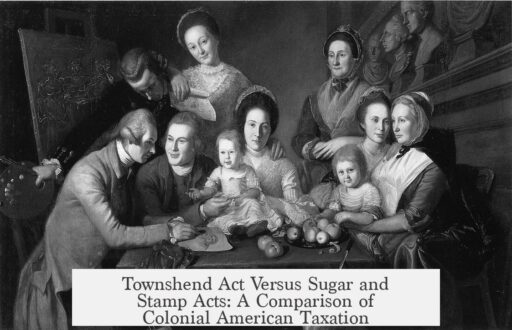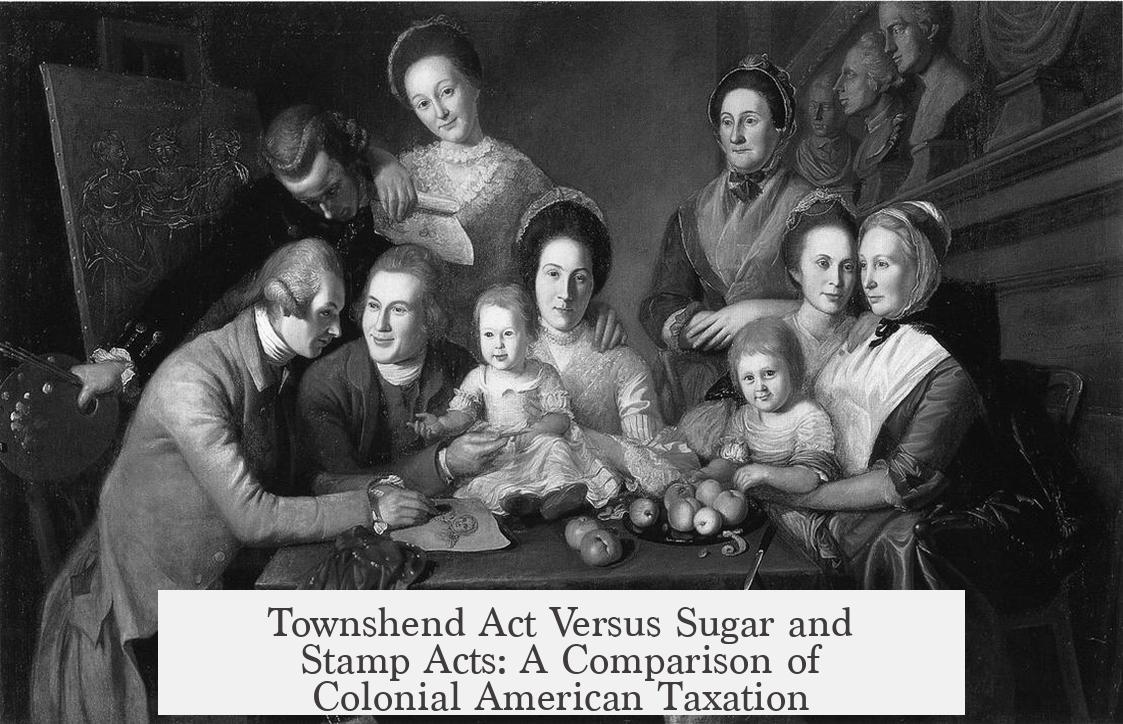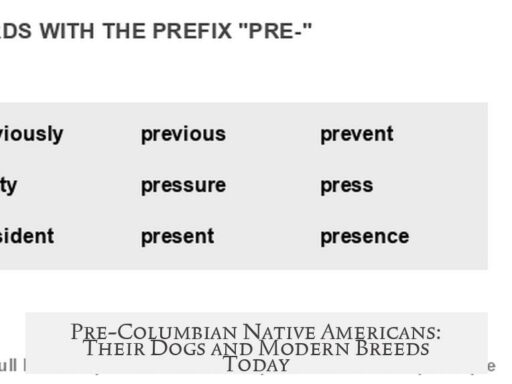The Townshend Act differed significantly from the earlier Sugar and Stamp Acts in Colonial America in its purpose, political impact, and the nature of colonial resistance. It imposed taxes on British goods aimed solely at raising revenue for England, undermined colonial assembly power by funding governors’ salaries, and triggered a more organized, inclusive, and cooperative colonial resistance movement.
The Sugar Act (1764) and the Stamp Act (1765) were early revenue measures imposed by the British Parliament to help cover debts from the Seven Years’ War. The Sugar Act taxed molasses and other imports, affecting New England merchants primarily. The Stamp Act required colonists to purchase specially stamped paper for official documents, newspapers, and legal papers, directly taxing a wide swath of colonial society.
Unlike these earlier acts, the Townshend Act (1767) targeted goods imported from Britain such as glass, paint, paper, and tea. It aimed strictly to generate income for Britain’s treasury rather than regulating trade under mercantilist policies. Colonists resented this, feeling the tax was designed only to fill British coffers without benefit to the empire.
Another key difference was the Townshend Act’s provision that revenues would partly fund colonial governors’ salaries. Previously, colonial assemblies controlled such payments and thereby checked governor power. This shift alarmed colonists as it eroded their political influence and reduced any leverage they had over royal officials.
Colonial reaction to these taxes also evolved over time. The Stamp Act sparked violent protests, including riots and intimidation of stamp collectors. While effective, this resistance was mostly local and sporadic.
- The response to the Townshend Act was more structured and widespread.
- Colonies organized nonimportation and non-consumption boycotts with intercolonial cooperation.
- Committees of Correspondence were formed to communicate and enforce collective action.
- Women played a significant role by circulating subscription lists and organizing textile production (“spinning bees”) to replace British imports.
The Townshend resistance included men of all classes, even those without voting rights, broadening political participation within colonial society. This inclusiveness and cooperation indicated that colonists viewed these taxes as threatening, rivaling or exceeding their concern for the Stamp Act.
While the Stamp Act crisis revolved around fiery, often violent outbreaks, Townshend Act opposition reflected growing political maturity. Colonists developed mechanisms to sustain resistance over time and involved broad swaths of society, strengthening the networks that would later fuel the revolutionary movement.
| Aspect | Sugar Act (1764) | Stamp Act (1765) | Townshend Act (1767) |
|---|---|---|---|
| Tax Target | Sugar, molasses imports | Stamped paper for documents | Imported British goods (glass, tea, paper) |
| Purpose | Raise revenue, regulate trade | Raise revenue | Raise revenue for British treasury |
| Political Impact | Limited colonial political effect | Strong colonial opposition, direct taxation | Undermined colonial assemblies by paying governors |
| Colonial Resistance | Some protests and petitions | Violent riots and intimidation | Organized boycotts, intercolonial cooperation, greater inclusion including women |
| Coordination | Largely local | Largely local and sporadic | Intercolonial Committees of Correspondence |
The Townshend Act’s broader scope ignited sustained opposition that integrated consumer politics and political activism. This approach shaped American resistance by expanding citizen engagement, particularly fostering political agency for groups like women who had previously remained outside formal political structures.
The colonial response demonstrated growing unity, foreshadowing the more coordinated revolutionary efforts that followed. While the Stamp Act protests were more immediately disruptive, the Townshend resistance helped deepen political organization and set precedents for collective action.
- The Townshend Act taxed British goods mainly for English revenue, unlike broader mercantilist aims of the Sugar Act.
- It threatened colonial political power by funding governors directly, bypassing assemblies.
- Colonial resistance to Townshend involved organized, inclusive boycotts and intercolonial cooperation.
- Women actively participated in resistance through subscription lists and spinning bees.
- Townshend resistance signaled a shift toward structured, widespread political activism preceding the Revolution.
These distinctions reveal the Townshend Act as a pivotal moment in colonial resistance, differing in intent and reaction from the earlier Sugar and Stamp Acts.
How did the Townshend Act’s tax differ from the Sugar and Stamp Acts?
The Townshend Act taxed British goods to raise revenue for England, unlike the Sugar and Stamp Acts which had different focuses. It did not align with mercantilism and angered colonists as it funded Parliament, not colonial interests.
What political effect did the Townshend Act have on colonial power?
The Act paid colonial governors’ salaries from tax revenue, weakening elected assemblies’ control over governors. This shift reduced the colonies’ already limited representation and altered power dynamics.
How did colonial resistance to the Townshend Act compare to the Stamp Act response?
Resistance to the Townshend Act was more organized and cooperative across colonies. Unlike the violent Stamp Act protests, the Townshend resistance involved formal agreements and committees coordinating boycotts.
What role did women play in resisting the Townshend Act?
Women circulated subscription lists for boycotts and organized “spinning bees” to make homespun goods. Some even wrote essays opposing the Act, marking increased political participation.
Were colonists more serious about resisting the Townshend or Stamp Acts?
Though the Stamp Act protests were violent, the structured, inclusive Townshend resistance shows colonists took the threat seriously. Many saw the Townshend Acts as a significant political challenge.




